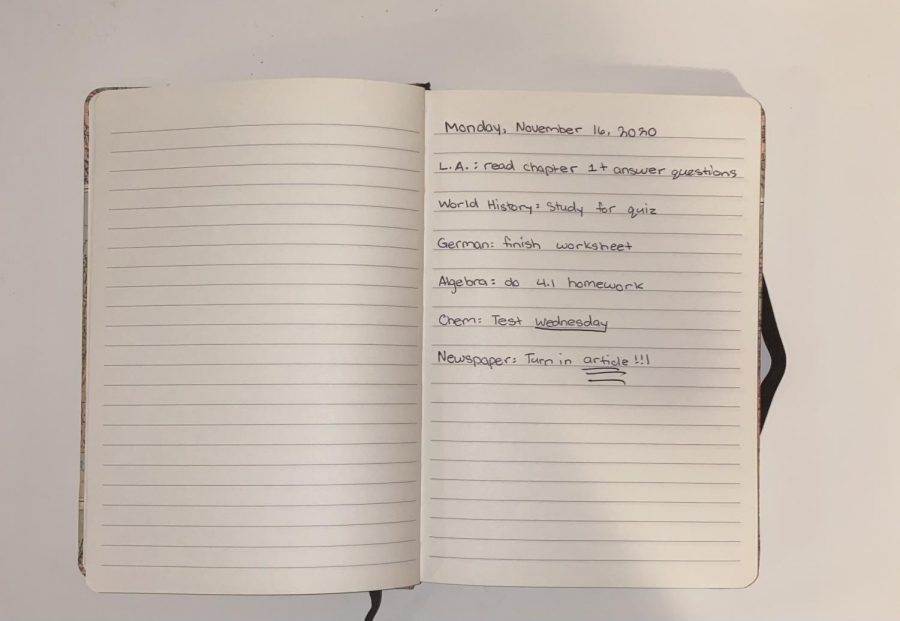How To Not Procrastinate: Tips From a Procrastinator
Keeping a planner will help keep you on track and not forget to complete any assignments.
November 25, 2020
Over quarantine, people overly adapted to the new and easy lifestyle of not doing anything all day. Going into school, students kept that same mindset and continued to live their days doing nothing that required too much brainpower. However, with this lifestyle, students pushed off their assignments until the last minute, and lost all motivation to do work and put effort into school. Now, believe me, I am no exception to this trend, but everyone knows the saying “the students become the teacher”, so I am here, an expert of procrastinating, to give the best tips and tricks to just do your work.
One of the most common causes of procrastination is feeling overwhelmed by all the work you have to do. Not keeping an everyday planner with your assignments written down can lead to this excessive stress. Most students have completely thrown out the idea of organizing their assignments in a notebook that clearly state all the work they need to do that day, which can cause extra stress and lead to students forgetting what assignments to do. It is also important to keep a timeline of when you want to get assignments done. This helps keep students on track to get all of their assignments done, instead of just taking an excessively long time on a particular one. The start of an efficient homework session is to be prepared with all your assignments and know when they are due.
Secondly, it is vital to dig deep and find some motivation to actually sit down and do your assignments in a timely manner. Setting small goals throughout the day can help students find the strength to get work done. For example, setting the goal of starting homework at 3:00 p.m. gives yourself enough time to get a snack and relax for some time after school. Then, once you finally settle down to do work, setting another goal to get at least an hour of work done, or complete one assignment before taking a small break, and then starting another assignment or doing another hour of homework until you have finally finished all your work. Small check marks like these will give students a sense of determination to achieve the goal, and gives the students something to celebrate. Camille Khong (10) admits that she “cannot deny the satisfaction of taking a break for ‘just five more minutes’, but it’s the process of developing better habits not just to get a task done, but for a better lifestyle that will benefit you in the long run.”
One of the most crucial parts of not procrastinating is to eliminate all distractions while working on assignments. It means nothing when you sit down with all your homework at hand if you are just going to get sidetracked and go on your phone or focus on the TV. These obstacles are some of the hardest to overcome because your phone is just a reach away, but the ending reward of actually getting your homework done, rather than scrolling through TikTok is much more satisfying, and you will thank your future self for now being able to relax without having to worry about that assignment due at 11:59 p.m.
Prioritizing time to stop procrastination is not a skill that you will master over time. However, it is a skill that is worth the effort, for it will create important, useful habits that will lead to success in the future. There will be many instances while in college, or even when you find a stable job, that you will look back and thank yourself for establishing these habits while you are still developing and growing. By following the simple steps of keeping a planner, setting goals, and eliminating distractions, you will soon find that procrastination will become less of a problem and your work habits will be affected in a positive way.








































Anita Tun • Feb 14, 2021 at 10:54 PM
It is difficult to break the habits I gained from procrastinating over these years but I hope to use these tactics to fix my procrastination. Great article Katelyn!
Hayden MacDonald • Dec 10, 2020 at 8:51 PM
As a procrastinator myself, I have been trying my best to break these habits. I do think it becomes worse for myself when I go from having little work to overloading work. This is because I was used to not having to worry about time management. Awesome job!
Fiona Salisbury • Dec 10, 2020 at 3:04 PM
As someone who has lost a lot of motivation over the pandemic and also as someone who procrastinates a lot in general, I appreciate all of the tips that you have!
Eunice Ahn • Dec 10, 2020 at 8:52 AM
I too am a pro procrastinator, and I have been finding some ways to help me procrastinate less. Some ways I have tried is being more organized, which is hard since I always get messy real quick. Another thing that helped was setting my phone to work mode so my phone was just completely off and blocked from receiving notifications. But of course, it is still hard to not procrastinate.
Blake Kingsbury • Dec 10, 2020 at 7:44 AM
I think many of us can relate to this article, especially with how much the ability to procrastinate has increased this year due to the pandemic. Hopefully we can all break this habit!
Tiana Salisbury • Dec 9, 2020 at 4:44 PM
As a frequent procrastinator, I hope I can learn from some of these tips so that I can get my work done faster. Great work Katelyn!
danielle huizar • Dec 8, 2020 at 11:57 AM
As high schoolers, we are inclined to procrastinate on many assignments, and I have, on multiple occasions, waited until the last minute to start a major project or essay. I like how you included the reasons for procrastination and some tips to prevent procrastination.
Sarah Lemos • Dec 8, 2020 at 9:23 AM
lol, I have been a procrastinator since like 4th grade at least. I got so used to my rushed work and last minute studying. When the pandemic hit, it just got worse. Some of the tips you’ve mentioned I use often to at least get me on track.
Kylie de Best • Dec 7, 2020 at 2:43 PM
I agree. Quarantine has made me less motivated to do my work, as I don’t have as much of a consistent schedule as I am used to. However, with the more school work I am getting I am continuously striving to get a better routine so I don’t procrastinate.
Kayden Mandley • Dec 7, 2020 at 8:43 AM
Being a huge procrastinator myself, this article was very helpful. I’ll be sure to remember these tips for my next big assignment. Great job, Katelyn!
Emily Eslao • Dec 4, 2020 at 8:05 PM
This article is really calling me out T-T I totally agree that the pandemic has impacted my procrastinating habits; mostly it’s hard for me to focus, but I’m really grateful for these tips!
Emily Eslao • Dec 4, 2020 at 8:05 PM
This article is really calling me out T-T I totally agree that the pandemic has impacted my procrastinating habits; mostly it’s hard for me to focus, but I’m really grateful for these tips!